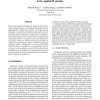Free Online Productivity Tools
i2Speak
i2Symbol
i2OCR
iTex2Img
iWeb2Print
iWeb2Shot
i2Type
iPdf2Split
iPdf2Merge
i2Bopomofo
i2Arabic
i2Style
i2Image
i2PDF
iLatex2Rtf
Sci2ools
CSFW
2008
IEEE
2008
IEEE
Automated Verification of Remote Electronic Voting Protocols in the Applied Pi-Calculus
We present a general technique for modeling remote electronic voting protocols in the applied pi-calculus and for automatically verifying their security. In the first part of this paper, we provide novel definitions that address several important security properties. In particular, we propose a new formalization of coercion-resistance in terms of observational equivalence. In contrast to previous definitions in the symbolic model, our definition of coercion-resistance is suitable for automation and captures simulation and forcedabstention attacks. Additionally, we express inalterability, eligibility, and non-reusability as a correspondence property on traces. In the second part, we use ProVerif to illustrate the feasibility of our technique by providing the first automated security proof of the coercion-resistant protocol proposed by Juels, Catalano, and Jakobsson.
Applied Pi-calculus | CSFW 2008 | Important Security Properties | Remote Electronic Voting | Security Privacy |
| Added | 19 Oct 2010 |
| Updated | 19 Oct 2010 |
| Type | Conference |
| Year | 2008 |
| Where | CSFW |
| Authors | Michael Backes, Catalin Hritcu, Matteo Maffei |
Comments (0)

